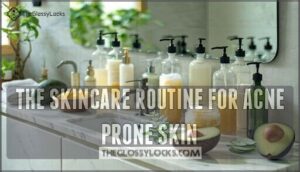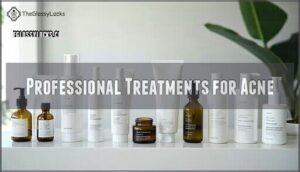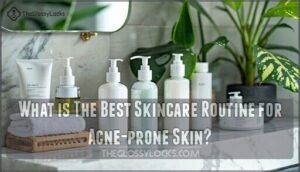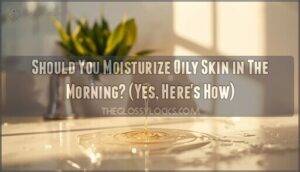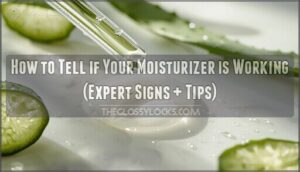This site is supported by our readers. We may earn a commission, at no cost to you, if you purchase through links.
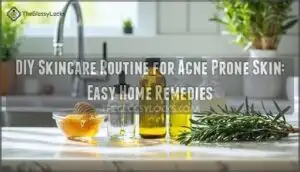
You’ll want to start with gentle, natural ingredients that won’t aggravate your skin further. Raw honey works as both a cleanser and mask, while diluted tea tree oil targets breakouts without overdrying. Apple cider vinegar makes an effective toner when mixed with water, and jojoba oil provides lightweight moisture that won’t clog pores.
The key is consistency and patience – your skin didn’t break out overnight, so it won’t clear up instantly either. Smart ingredient combinations and proper application techniques can transform your complexion using items from your kitchen and local health store.
Table Of Contents
- Key Takeaways
- DIY Skincare Routine for Acne-Prone Skin
- Understanding Oily Acne-prone Skin Type
- Understanding Combination Acne-prone Skin Type
- THE SKINCARE ROUTINE FOR ACNE PRONE SKIN
- Professional Treatments for Acne
- What is The Best Skincare Routine for Acne-prone Skin?
- How to Make Skincare Products at Home for Acne?
- How to Treat Acne at Home DIY?
- Frequently Asked Questions (FAQs)
- What homemade skincare is good for acne?
- What is the best skin routine for acne prone skin?
- What is the best homemade pack for acne prone skin?
- What should my skin care routine be to get rid of acne?
- What is the best skincare routine for acne-prone skin?
- How to make skincare products at home for acne?
- How to treat acne at home DIY?
- What should be your daily routine for acne?
- How long does it take for DIY acne treatments to work?
- What if I have sensitive skin?
- Conclusion
Key Takeaways
- Start with natural antibacterial ingredients like raw honey for cleansing and tea tree oil (properly diluted) for spot treatments – you’ll get powerful acne-fighting benefits without harsh chemicals that can irritate your skin further.
- Build consistency into your routine with gentle cleansing twice daily, followed by targeted serums and lightweight moisturizers – your skin needs time and regular care to heal, not aggressive treatments that strip its natural barrier.
- Mix DIY ingredients safely by always diluting essential oils with carrier oils like jojoba, patch-testing new combinations on your wrist first, and making small batches to prevent contamination and ensure freshness.
- Manage expectations and stay patient because homemade acne treatments typically show initial improvements within 1-2 weeks but require 4-6 weeks of consistent use for clearer skin – rushing the process often leads to irritation and setbacks.
DIY Skincare Routine for Acne-Prone Skin
Creating your own acne-fighting skincare routine at home can be both affordable and surprisingly effective when you use the right natural ingredients.
You’ll discover that simple DIY recipes using honey, tea tree oil, and gentle oils can often work better than expensive store-bought products while giving you complete control over what touches your skin, which is a key factor in achieving effective skincare.
1. Tea Tree Essential Oil
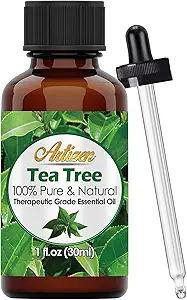
When targeting acne-prone skin, tea tree oil stands as one of nature’s most powerful antibacterial warriors. This essential oil naturally fights Cutibacterium acnes bacteria that cause breakouts while reducing inflammation.
Nature’s antibacterial warrior takes aim at acne-causing bacteria with fierce precision.
Here’s what makes tea tree oil essential for DIY acne treatment:
- Tea tree benefits: Kills acne bacteria and reduces redness without harsh chemicals
- Oil dilution ratio: Mix 1-2 drops with carrier oil to prevent irritation
- Tea tree sources: Choose 100% pure oil in dark glass bottles for potency
- Tea tree allergies: Always patch-test on your wrist before facial application
- Tea tree alternatives: Consider lavender or chamomile if you’re sensitive
For natural acne remedies, start with a 5% dilution—it’s clinically proven effective yet gentle. Remember, pure tea tree oil can burn sensitive skin, so don’t skip the dilution step. Your antiinflammatory skincare routine deserves this powerhouse ingredient that’s been clearing complexions for centuries.
2. Carrot Seed Oil for Skin and Hair
Carrot seed oil packs a powerful punch for your acne prone skin journey. This golden elixir delivers Carrot Seed Benefits through antiinflammatory properties that calm angry breakouts while promoting cellular renewal.
The Oil Extraction Methods preserve potent antioxidants that detoxify skin naturally. You’ll love its Hair Growth Potential – massaging diluted carrot seed oil into your scalp stimulates circulation and strengthens follicles.
However, watch for Skin Irritation Risks by always mixing with carrier oils like jojoba or sweet almond. Alternative Oil Uses include mixing it into your DIY skincare recipes or adding drops to your moisturizer.
This earthy-scented natural ingredients hero absorbs quickly, leaving skin soft without clogging pores. Best For: Anyone seeking versatile, antioxidant-rich oil for clearer skin and healthier hair.
3. Vitamin E Oil Pure Natural
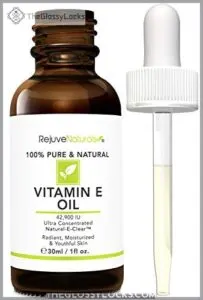
Vitamin E oil delivers powerful antioxidant benefits for acne-prone skin. This thick, golden oil comes from natural sources like wheat germ and sunflower seeds, with purity levels varying between brands.
You’ll want to start slowly since vitamin E oil can feel heavy on oily skin. Mix 2-3 drops with your regular moisturizer rather than applying it straight – this prevents clogged pores while still giving you the vitamin E benefits.
The oil helps fade acne scars and evens out skin tone over time. It can also provide moisturizing benefits, reducing water loss.
Watch for potential side effects like breakouts or irritation, especially if you’re sensitive to tocopherols. Some folks see results in weeks, while others need a few months of consistent use.
Application techniques matter here. Pat gently into clean skin before bed, focusing on problem areas. Since it’s part of your DIY skincare routine, pair it with other natural ingredients that won’t compete for absorption.
Best For: Evening out skin tone, reducing acne scars, and adding antioxidant protection to your natural skincare routine.
4. Nate’s Raw Honey Squeeze Bottle
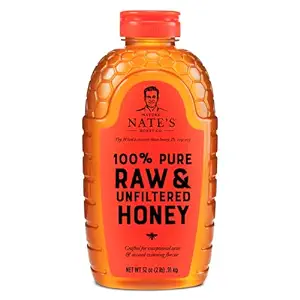
Nate’s Raw Honey Squeeze Bottle delivers pure liquid gold for your acne skincare routine.
This 100% raw, unfiltered honey packs natural antibacterial power that’ll make your skin sing.
You’re getting award-winning quality that’s gently warmed for easy application – no wrestling with thick, stubborn honey here.
The honey benefits are incredible: it fights acne-causing bacteria while soothing inflammation.
Squeeze bottle uses couldn’t be simpler – just drizzle directly onto clean skin or mix into DIY skincare masks.
The honey consistency stays smooth and workable, though it might crystallize in cold weather (totally normal!).
For honey application, try it as a spot treatment on angry breakouts or create honey masks by mixing with turmeric or oatmeal.
Honey storage is easy – keep it at room temperature.
This raw honey transforms your acne skincare routine naturally, giving acneprone skin the gentle care it craves.
Best For: Those wanting authentic raw honey for DIY skincare treatments.
5. Burt’s Bees Acne Cleanser
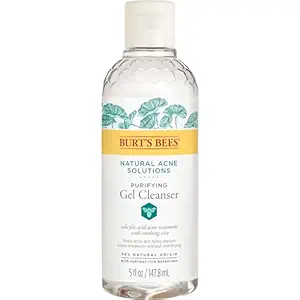
Burt’s Bees Acne Cleanser brings the power of natural skincare to your daily skincare routine.
This gentle cleanser acne fighter contains salicylic acid from willow bark – nature’s way of unclogging pores without the harsh chemicals.
The Burts Ingredients include evening primrose and beetroot extracts that work alongside the acne treatment formula.
This Formula Breakdown shows 98% natural ingredients that won’t strip your skin like some drugstore options.
User Reviews consistently praise its Cleanser Efficacy for acneprone skin, with many reporting fewer breakouts within weeks.
The noncomedogenic formula means it won’t clog pores – a game-changer for stubborn acne.
While Product Alternatives exist, this cleanser strikes the perfect balance between gentle and effective.
It’s like having a spa-quality natural skincare treatment in your bathroom cabinet, minus the hefty price tag.
6. S.W Basics Rosewater Tea Tree Cleanser
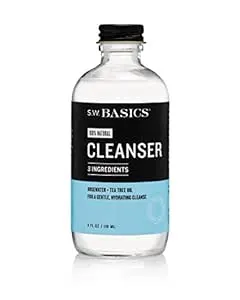
While Burt’s Bees offers powerful acne-fighting ingredients, sometimes your skin needs a gentler approach. Enter S.W Basics Rosewater Tea Tree Cleanser—a game-changer for sensitive, acne-prone skin.
This 8.8-ounce cleanser combines organic rosewater’s soothing properties with tea tree oil’s proven acne-fighting power. The gentle cleanser acne formula skips harsh sulfates and alcohol, making it perfect for your skincare routine.
Here’s what makes this natural acne fighter special:
- Ingredient Benefits: Organic rosewater calms inflammation while tea tree oil targets bacteria
- Rosewater Properties: Balances pH and reduces redness without stripping skin
- Tea Tree Efficacy: Naturally antibacterial without harsh chemicals
- Cleanser Alternatives: Soap-free formula won’t over-dry sensitive skin
- Skin Compatibility: Gentle enough for daily use on reactive skin
Though pricier than drugstore options, it’s worth considering if traditional cleansers irritate your skin. Just remember—it’s gentle, not miraculous.
7. Dr Bronners Baby Unscented Castile Soap
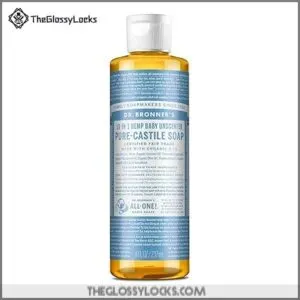
While Dr. Bronner’s name packs a punch, this baby unscented castile soap delivers gentle power for acne-prone skincare routines. Made with over 70% organic ingredients, it’s your ticket to clean skin without the harsh chemical baggage.
This concentrated formula means you’ll get serious value – it’s 3x stronger than regular liquid soaps. The unscented version won’t irritate sensitive or acne-prone skin, making it perfect for your natural acne fighters arsenal.
| Feature | Benefit | Acne Impact |
|---|---|---|
| pH balanced | Maintains skin barrier | Reduces irritation |
| Concentrated formula | Cost-effective | Gentle on budget and skin |
| Chemical-free | No synthetic preservatives | Won’t clog pores |
Castile soap benefits shine through its versatility – you can dilute it for face washing or use it full-strength for stubborn spots. Soap dilution ratios matter: try 1:1 with water for facial cleansing. The castile soap pH sits around 9, so follow up with a toner to restore balance. This gentle acne cleanser respects baby skin safety standards while fighting breakouts naturally.
8. Raw Wildflower Honey 2 Pound
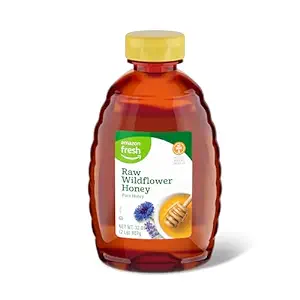
Raw wildflower honey packs serious honey antibacterial properties that make it a powerhouse for acne-prone skin.
This sticky golden treasure contains raw honey enzymes that naturally fight breakout-causing bacteria while gently moisturizing your face.
You’ll get amazing wildflower honey benefits when you whip up honey mask recipes – just mix a tablespoon with water for instant honey skin healing.
The natural acne fighters in honey work overtime to calm inflammation and speed up healing.
This 2-pound bottle gives you plenty for homemade acne mask experiments and skincare recipes.
Mix it into your homemade skincare routine by adding honey to cleansers or using it solo as a weekly treatment.
Don’t worry if it crystallizes – that’s nature doing its thing!
Your skin will thank you for this sweet addition.
Best For: Anyone wanting powerful antibacterial action in their natural skincare arsenal.
9. Cliganic Organic Jojoba Oil
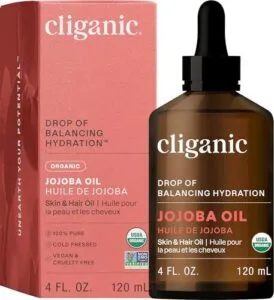
After honey’s gentle cleansing power, you’ll want to lock in moisture with Cliganic Organic Jojoba Oil.
This USDA-certified organic oil is your skin’s best friend – it actually mimics your natural sebum, so your skin thinks it’s getting what it already produces. Pretty clever, right?
Unlike heavier oils that can clog pores, jojoba oil benefits include being completely non-comedogenic, making it perfect for acne-prone skin care. The organic certification impact means you’re getting pure, chemical-free goodness that won’t irritate sensitive skin.
Oil purity matters when you’re dealing with breakouts, and this Cliganic brand review consistently shows excellent results. Just a few drops work wonders in your natural skincare routine, absorbing quickly without leaving you looking like a glazed donut.
Best For: Those with acne-prone skin seeking a gentle, deeply hydrating, and non-comedogenic oil.
Understanding Oily Acne-prone Skin Type
You’ve got oily skin – your sebaceous glands are basically working overtime, pumping out excess sebum production that leaves you looking like you’ve been glazed like a donut.
This sebum overproduction creates the perfect breeding ground for Cutibacterium acnes, the bacteria that loves to party in your enlarged pores.
Here’s what’s happening: that extra oil mixes with dead skin cells, creating poreclogging cocktails that trigger inflammation factors.
Your genetic predisposition might be calling the shots here, but don’t blame your parents just yet! The good news? Oily skin often ages slower because natural oils keep things plump.
Managing this skin type means understanding acne formation starts with bacterial growth in those clogged pores.
You’ll need gentle cleansing that removes excess oil without triggering more production – it’s all about balance, not stripping your skin bare.
Understanding Combination Acne-prone Skin Type
If you’ve got combination skin, you’re dealing with an oily T-zone (forehead, nose, chin) while your cheeks stay normal or even a bit dry.
This mixed-up situation means you’ll need a skincare routine that can handle both worlds without making either area worse.
Include Toner to Refine Enlarged Pores
Large pores driving you crazy? Toners packed with salicylic acid work like tiny scrub brushes, dissolving oil buildup inside your pores.
They balance your skin’s pH levels too, which keeps acne bacteria from throwing a party on your face. Chemically exfoliating toners can also gently cleanse the skin.
Here’s what makes toners your pore-refining MVP:
- Salicylic acid penetrates deep to unclog stubborn pores
- pH balancing creates an unfriendly environment for acne bacteria
- Astringent properties temporarily tighten skin for smoother appearance
Include Anti-acne Face Serum
Now you’ll supercharge your acne-prone skincare routine with a targeted anti-acne face serum. This concentrated treatment works between your toner and moisturizer to deliver powerful acne-fighting ingredients directly to problem areas.
Serum Benefits for acne treatment:
- Penetrates deeper than cleansers for maximum effectiveness
- Reduces inflammation and calms angry breakouts quickly
- Prevents future acne by keeping pores clear
- Fades post-acne marks for smoother skin texture
Serum Ingredients like niacinamide, azelaic acid, and tea tree oil target acne-causing bacteria while being gentler than harsh treatments. Application Techniques matter—apply 2-3 drops to clean skin, avoiding the eye area. Serum Alternatives include spot treatments if full-face application causes irritation.
Salicylic Acid
Salicylic acid’s pore penetration abilities make it perfect for acne treatment. This BHA provides gentle acid exfoliation, dissolving dead skin cells that clog pores.
You’ll find it in exfoliating serums and salicylic acid cleansers. The salicylic benefits include reduced blackheads and smoother skin texture.
For sensitive skin, consider gentle PHA options for exfoliation. Serum formulations typically contain 0.5-2% concentrations for effective acne management without irritation.
Niacinamide
Niacinamide benefits your skin barrier and reduces acne inflammation like a gentle superhero.
This water-soluble vitamin works at 5-10% serum concentration without typical niacinamide side-effects.
You can safely combine it with other acne treatments in your skincare routine, perfect for sensitive skin types.
It calms irritation while targeting breakouts effectively, making it a great option for those looking for a gentle yet effective treatment.
THE SKINCARE ROUTINE FOR ACNE PRONE SKIN
You’ll need both daily and weekly routines to keep acne-prone skin clear and healthy.
The right combination of gentle cleansing, targeted treatments, and consistent care can make all the difference in managing breakouts without overdoing it, which involves consistent care.
Daily Skincare Routine
With acne-prone skin, consistency isn’t just helpful—it’s your secret weapon for clearer days ahead.
Building a solid daily skincare routine creates the foundation your skin needs to heal and thrive, giving you the control you’ve been searching for.
Morning Routine:
- Cleanse with a gentle, anti-acne formula to remove overnight buildup
- Apply targeted serums with salicylic acid or niacinamide for acne control
- Moisturize with lightweight, oil-free products to maintain hydration
- Protect with broad-spectrum SPF 30+ sunscreen (sunscreen importance can’t be overstated!)
Evening Routine:
Start with thorough makeup removal, then cleanse again for complete product layering preparation.
Apply your treatment serums, followed by overnight treatments that work while you sleep.
To combat aging, consider incorporating retinoids for skin renewal into your routine.
Your skincare for acne doesn’t have to be complicated—this daily skincare routine gives you routine customization options that fit your lifestyle.
Remember, your acneprone skincare journey is marathon, not a sprint, so stick with these steps consistently for best results.
Weekly Skincare Routine
Once weekly, exfoliating your acne-prone skin with gentle chemical exfoliants removes dead cells that clog pores.
Follow with a clay mask for acne to absorb excess oil and purify skin.
Complete your weekly skincare routine with spot treatments containing salicylic acid for active breakouts.
Customized skincare regimens can further improve outcomes with personalized products.
These routine adjustments enhance your daily regimen’s effectiveness.
Professional Treatments for Acne
While DIY remedies can help manage acne, you’ll sometimes need stronger professional treatments to tackle stubborn breakouts.
Understanding the key categories—cleansers, toners, spot treatments, actives, and moisturizers—helps you choose the right professional-grade products for your skin’s specific needs, including the use of professional-grade products.
Cleansers
Finding the right cleanser is your first line of defense against breakouts. Think of it as setting the foundation for your entire skincare routine – you wouldn’t build a house on shaky ground, right?
Here are key features to look for:
- Gentle cleansers with antibacterial properties that won’t strip your skin’s natural moisture barrier
- Natural face washes containing acne-fighting ingredients like tea tree oil or salicylic acid for effective skin cleansing
- Clarifying cleanser formulas that maintain proper cleanser pH levels without harsh sulfates or parabens
Consider double cleansing if you wear makeup or sunscreen daily – this cleansing technique guarantees thorough removal of impurities while keeping your acne-prone skin care routine effective yet gentle. Selecting the best acne cleanser is vital for managing acne.
Toners
Think of toners as your skin’s reset button—they sweep away leftover dirt while restoring balance after cleansing.
For acne-prone skin, alcohol-free formulas with natural ingredients work best to calm inflammation without over-drying. You can find an alcohol-free toner for acne.
| Toner Ingredients | Toner Benefits | Toner Application |
|---|---|---|
| Witch Hazel | Tightens pores, reduces oil | Cotton pad, gentle sweeps |
| Rose Water | Balances pH naturally | Spray bottle or cotton pad |
| Aloe Vera | Soothes irritated skin | Pat gently, don’t rub |
| AHAs | Exfoliates dead cells | Use 2-3 times weekly |
Apply toner after cleansing but before serums—it’s like prepping a canvas before painting.
Spot Treatments
When stubborn breakouts won’t budge, spot treatments become your secret weapon.
These targeted solutions pack concentrated active ingredients like benzoyl peroxide or salicylic acid to tackle individual pimples head-on.
Pimple patches offer gentle inflammation reduction while protecting against picking.
Professional acne spot treatment options guarantee proper ingredient concentration and patch effectiveness.
To find the right product, you may want to examine various treatment options.
Remember, consistent application frequency prevents scarring prevention while delivering powerful acnefighting results.
Actives
Incorporating active ingredients into your acne routine can feel like exploring a chemistry lab, but these powerhouse compounds deliver real results when used correctly.
Professional treatments often rely on proven actives that target acne at its source, making them essential for stubborn breakouts.
Key active ingredients work through different mechanisms:
- Benzoyl peroxide and salicylic acid form the foundation of most acne treatments, with benzoyl peroxide killing bacteria while salicylic acid unclogs pores
- Retinoids like adapalene and azelaic acid promote cell turnover and reduce inflammation, though they require careful introduction to avoid irritation.
Understanding concentration levels is vital—you don’t want to jump into the deep end with high-strength formulas.
Start low and go slow, especially when combining product combinations.
Sensitivity concerns are real, so patch-testing prevents those "my face is on fire" moments.
Consider long-term effects too; consistent use of appropriate actives can transform your skin, but overdoing it leads to irritation and setbacks.
Moisturiser
Moisturizers aren’t optional for acne-prone skin—they’re essential for maintaining your skin’s protective barrier.
When you strip away natural oils with harsh treatments, your skin overcompensates by producing even more sebum, creating a vicious cycle. Look for lightweight formulas with noncomedogenic ingredients like hyaluronic acid and niacinamide that provide hydration without clogging pores.
These hydrating ingredients help achieve proper oil balance while supporting skin repair. Apply your oil-free moisturizer to slightly damp skin for better absorption, and don’t skip this step even when your skin feels oily—hydration importance can’t be overstated for clear skin.
What is The Best Skincare Routine for Acne-prone Skin?
The perfect acne routine for acne-prone skin isn’t rocket science, but it does require understanding your skin’s unique needs and following proven Acne Routine Steps consistently.
Your skincare routine should focus on gentle cleansing, targeted treatment, and proper moisturizing while maintaining Skin Barrier Health through careful Product Layering.
Here’s what works best:
- Morning routine: gentle cleanser, acne treatment serum, lightweight moisturizer, and broad-spectrum SPF
- Evening routine: double cleanse if wearing makeup, targeted spot treatment, and nourishing moisturizer
- Weekly additions: gentle exfoliation and clarifying masks for deeper pore care
The secret lies in Ingredient Synergies—pairing salicylic acid with niacinamide, or combining tea tree oil with soothing ingredients like aloe vera.
Addressing increased sebum production can also substantially improve acne.
Remember, Lifestyle Impacts like stress and diet affect your skin too, so don’t ignore the bigger picture while perfecting your acne treatment approach.
How to Make Skincare Products at Home for Acne?
Beyond your typical drugstore remedies, crafting your own acne-fighting products puts you in the driver’s seat of your natural skincare journey.
Here’s your simple roadmap to homemade success:
- Start with proven DIY acne ingredients like raw honey, tea tree oil, and jojoba oil that pack antibacterial punch without harsh chemicals
- Master essential oil dilution by mixing 1-2 drops tea tree oil per tablespoon of carrier oil to avoid skin irritation
- Create preservative-free skincare in small batches, storing homemade cleanser recipes and natural acne moisturizers in the fridge for freshness
Remember, these herbal remedies and skincare recipes work best when you patch-test first—your skin will thank you for the gentle acne treatment approach.
How to Treat Acne at Home DIY?
Now that you know how to create your own products, let’s talk about actually treating those stubborn breakouts. DIY acne treatment starts with understanding your skin’s unique needs—what works for your friend might backfire on your face.
Here’s your game plan for natural acne remedies:
- Spot-treat with tea tree oil (diluted to 5-10%) for targeted antibacterial action
- Apply raw honey masks twice weekly to soothe inflammation and promote healing
- Use gentle exfoliation with oatmeal or sugar to prevent clogged pores
Remember, homemade skincare risks include allergic reactions and bacterial contamination. While DIY ingredient benefits like honey’s antimicrobial properties are real, professional vs. DIY treatments differ substantially in concentration and safety testing. Always patch-test new ingredients and maintain a consistent acne-prone skin care routine for best results.
Frequently Asked Questions (FAQs)
What homemade skincare is good for acne?
Funny how honey’s been hiding in your kitchen cabinet all along—it’s nature’s acne-fighting superstar.
Try raw honey masks, gentle herbal steams with chamomile, or jojoba oil blends for clearer skin.
What is the best skin routine for acne prone skin?
Start with a gentle cleanser that won’t strip your skin, then apply a salicylic acid serum to unclog pores. Follow with a lightweight moisturizer and always finish with SPF daily.
What is the best homemade pack for acne prone skin?
Hitting the bullseye with homemade packs means mixing honey and turmeric for powerful results.
You’ll get anti-inflammatory benefits that calm breakouts while turmeric’s antibacterial properties target acne-causing bacteria naturally and effectively.
What should my skin care routine be to get rid of acne?
Your acne-fighting routine needs four key steps: gentle cleanser morning and night, salicylic acid serum, lightweight moisturizer, and daily SPF 30+ sunscreen to prevent breakouts.
What is the best skincare routine for acne-prone skin?
Like trying to tame a wild beast, managing acne-prone skin requires gentle consistency.
Start with a mild cleanser, follow with salicylic acid serum, apply lightweight moisturizer, and don’t skip sunscreen daily.
How to make skincare products at home for acne?
You’ll need honey, jojoba oil, tea tree oil, and shea butter as your base ingredients.
Mix honey with castile soap for cleansing, then blend oils with shea butter for moisturizing—but patch-test first!
How to treat acne at home DIY?
Breakouts can feel like your skin’s declaring war, but you’ve got powerful allies at home.
Try honey masks, gentle tea tree oil spots treatments, and chamomile toners to calm inflammation naturally.
What should be your daily routine for acne?
Your daily routine should include gentle cleansing morning and night, applying an acne-fighting serum with salicylic acid, using lightweight moisturizer, and never skipping SPF protection during the day.
How long does it take for DIY acne treatments to work?
Surprisingly, your homemade acne fighters need patience—just like store-bought treatments.
You’ll typically see initial improvements within one to two weeks, but clearer skin takes four to six weeks of consistent use.
What if I have sensitive skin?
Test all DIY ingredients carefully if you’ve got sensitive skin. Start with gentle options like honey masks or diluted chamomile toner. Always patch-test first.
Conclusion
Like Rome wasn’t built in a day, your clear skin won’t appear overnight – but it’s absolutely achievable.
Your DIY skincare routine for acne prone skin doesn’t need expensive products or complicated steps.
Stick with gentle, natural ingredients like honey, tea tree oil, and jojoba oil while maintaining consistency.
Remember, patience is your best friend here.
Give these home remedies time to work their magic, and you’ll see real improvements in your complexion without breaking the bank.
- https://www.nytimes.com/article/acne-skincare-routine.html
- https://www.cerave.com/skin-smarts/skincare-tips-advice/a-simple-3-step-acne-routine-to-take-control-of-acne
- https://www.medicalnewstoday.com/articles/322455
- https://www.webmd.com/skin-problems-and-treatments/acne/acne-alternative-treatments
- https://www.cosmopolitan.com/style-beauty/beauty/a39774921/diy-skincare-helped-treat-my-acne/


